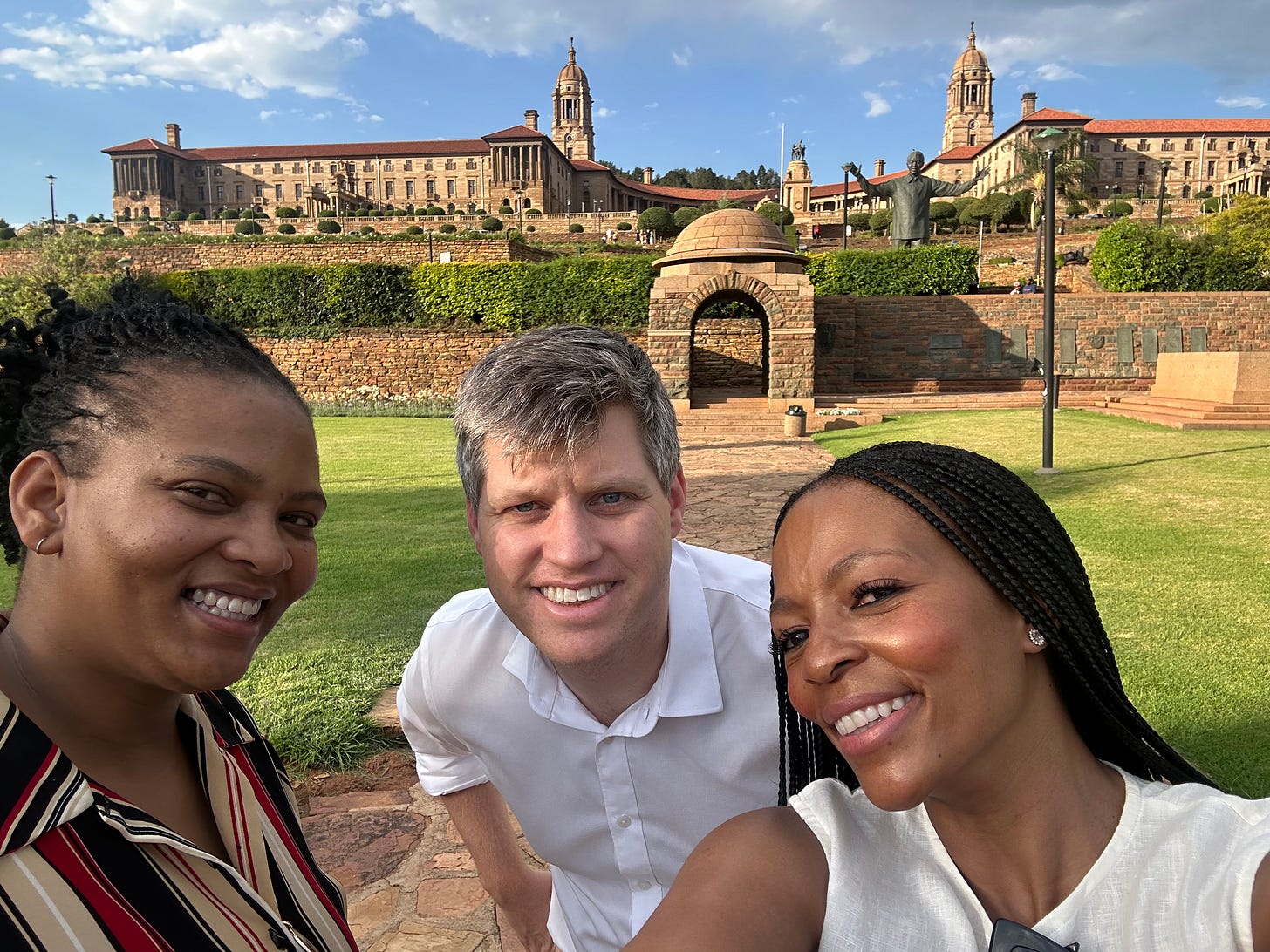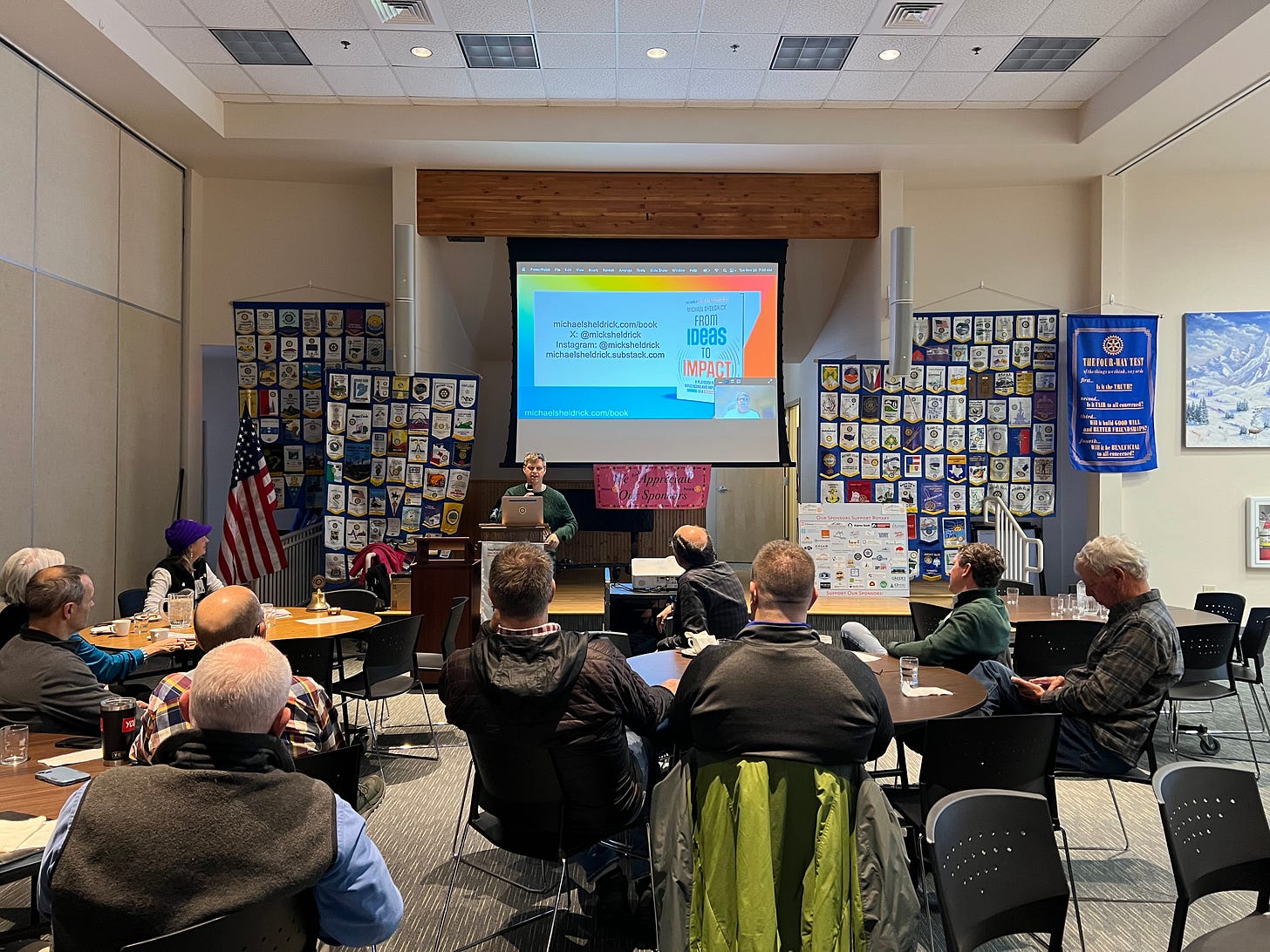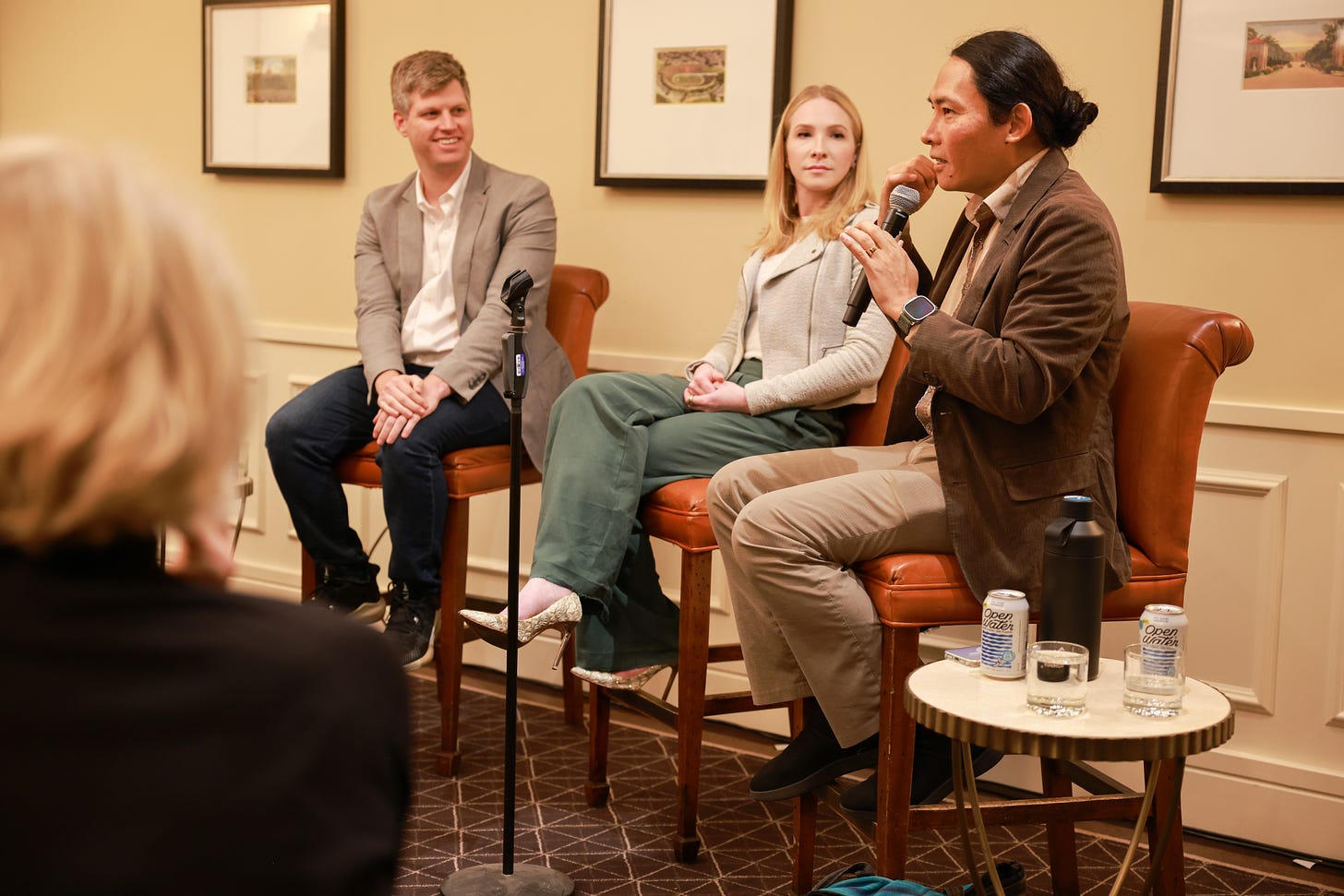Global Citizen Backs Life-Saving Summit | $100B Pledged to Fight Poverty | GC Prize Nominations Closing Soon | 4 Key Lessons from the Book Tour
Plus, four key insights from the book tour: change begins locally, clubs strengthen democracy, prove your model before shaping policy, and South Africa leads in energy innovation.
Dear Friends and Supporters,
December is here already—this year has flown by! I’m writing from South Africa, where the country is stepping into a major leadership role as it takes over the G20 presidency—the group of the world’s largest economies that comes together to address global challenges. With so much division and new crises in the world, many people feel like their actions don’t make a difference. But now is the time to show that change is possible.

On the point of feelings of despair, if you know someone looking for ways to reclaim agency in their community or beyond, my book From Ideas to Impact might be the perfect holiday gift (available in print, on Audible, or as a signed paperback in South Africa, which has just been launched).
Thank you to everyone who has shared feedback and completed a review! Don’t forget to email your receipt to michael@michaelsheldrick.com to receive the special bonus chapter I’ve been crafting ahead of the holidays. A special thanks to those who have left reviews on Goodreads and Amazon—your support makes a big difference in giving visibility to first-time authors like me! Now, let’s dive in!
Global Citizen Joins Forces to Save 8 Million Lives
Global Citizen is proud to partner with the European Union and the Gates Foundation for a High-Level Pledging Summit in Brussels in 2025. This pivotal event aims to secure $9 billion in investments for Gavi, the Vaccine Alliance, to immunize 500 million children by 2030—helping to save 8 million lives.
This summit, co-hosted by the EU, the Gates Foundation, and Gavi, will showcase the transformative power of immunization in saving lives, strengthening health systems, and advancing sustainable development. Stay tuned for ways to get involved!
$100 Billion Secured to Fight Poverty
After a year of campaigning, world leaders gathered in Seoul for the International Development Association’s (IDA) 21st replenishment, securing nearly $100 billion in affordable financing to address extreme poverty and climate challenges in the world’s most vulnerable countries.
This success comes after months of Global Citizen’s advocacy alongside multiple partners, including the landmark Economic Development Assembly in Abidjan, co-presented with Bridgewater Associates. The $100 billion secured will fund essential areas like health, education, infrastructure, and climate resilience. Notably, it will help provide reliable electricity to 300 million people across Africa, transforming lives and driving sustainable development.
While the pledges fell short of the $120 billion target set by African leaders and more than 100 eminent individuals who signed the Abidjan Accord, this replenishment surpasses the previous $93 billion cycle—a significant step forward. Several countries demonstrated bold leadership by significantly increasing their commitments, including:
United Kingdom: Surprised many with a 40% increase—far exceeding initial expectations based on early outreach and flagged as promising by Ajay early on.
Norway and Denmark: Raised their contributions by 50% and 40%, respectively (Check out this video from Denmark’s Finance Minister, Nicolai Wammen, highlighting Denmark’s support for IDA and eradicating extreme poverty).
Spain: Announced a 37% increase on our stage.
Poland: Doubled its contribution with a remarkable 100% increase.
Brazil: Made a breakthrough pledge of $100 million, a dramatic leap from its modest contribution in the previous cycle.
Meanwhile, several key countries, including France, Canada, Switzerland, Italy, India, the Netherlands, the UAE, and Belgium, have yet to pledge, leaving significant potential for further contributions over the next 12 months. This opens a critical window for our campaign with the European Commission and President von der Leyen, alongside South Africa, to drive momentum in scaling up renewables across Africa and advancing the World Bank’s goal of providing energy access to 300 million people.
In the meantime, Global Citizen remains dedicated to ensuring these funds deliver real impact for communities in need, especially in Africa, which will shape the future global workforce. A special thanks to all partners for their vital role in advocating for this historic replenishment. Read our statement here and amplify on social media here.
Four Insights from Book Tour
One of the most rewarding aspects of the tour has been learning from others on the road. Here are four insights I’d like to share:
Real Change Starts at the Community Level
At the Denver book launch—kicked off by an exceptional performance from Wesley Schultz of The Lumineers and supported by Foundation Source—Mark Leon Goldberg, host of the Global Dispatches podcast (a must-listen for insightful takes on global issues and cooperation), shared a powerful reminder. He noted that while the recent climate talks in Baku concluded with a $300 billion goal—falling short of what many climate-vulnerable communities had hoped for—the real impact will depend not on the number itself but on what happens next.
The actual transformation will occur in living rooms, classrooms, cafes, and communities, where local advocates turn these global commitments into tangible action. At this level, funding reaches people, lives are changed, and decision-makers are held accountable for their promises.
And yet, it’s surprising how little effort is often devoted to communicating issues like “the $300 billion” in ways that resonate with everyday people. Such a large number can feel abstract or overwhelming, making it difficult to grasp or rally behind. To truly mobilize support, there’s a need for clear, relatable messaging that explains the rationale, breaks the figure into actionable country or community targets, and provides a tangible path for accountability and impact. This is why the second key step in my book is “knowing your target stakeholders and how to influence them,” and why the work of groups like Sound Future and Climate Changemakers (which I’ve written about previously here) is so essential.
Joining Clubs Helps Democracy Thrive
A relatively new documentary, Join or Die, based on the life and research of Robert Putnam (author of Bowling Alone), has gained fresh attention following the 2024 election. The film makes a compelling case that the health of democracy—and our overall well-being, economy, and politics—is closely tied to community participation. Or, put simply, joining clubs. As director Pete Davis puts it: “This is a film about why you should join a club.”
During my book tour, I’ve had the chance to visit local Rotary Clubs, including several in Colorado, where I saw Putnam’s theories in action. For instance, a local bookstore supplied books for my event—not because it was the cheapest option, but because its members, many of whom belong to the Rotary Club, prioritized supporting a community institution over Amazon. In Frisco, CO, the Rotary Club organized a massive Thanksgiving dinner, feeding hundreds and fostering connections in the community. Meanwhile, the Summit Club expressed their gratitude for my talk by covering the cost of 10 polio vaccinations—a small act with a big impact.

These clubs are where local ideas take root, where solutions to community challenges are found, and where mutual trust and reciprocity grow. I highlight more examples in my book, including the critical role clubs have played in holding leaders accountable for eradicating diseases like polio.
Join or Die is now streaming on Netflix, and I highly recommend checking it out. It’s a powerful reminder of the impact we can have when we come together (including by joining a club!).
Be a Policy Taker Before Becoming a Policy Shaper
During an engaging two-hour panel in Menlo Park, hosted by Foundation Source, one of the speakers, Tom Chi—Managing Partner of At One Ventures, a deep-tech VC firm focused on businesses with net-positive impacts—shared a thought-provoking insight. He emphasized the unique power of small businesses to influence policy by first proving a sustainable and scalable business model. By demonstrating viability, they can effectively shape broader policy landscapes, rather than attempting to influence policy from the outset—a strategy often fraught with challenges.

As Xinyi highlighted in her debut article, recapping the event:
As the US policy environment grows less certain, many question whether we have the right policies to combat climate change effectively.
Instead, businesses should aim to demonstrate viability regardless of the policy environment. Once they’ve proven viability, they’re in a stronger position to influence policy.
Greg Jackson, CEO of Octopus Energy, a startup that has become the UK’s largest home electricity provider, exemplifies the success of this strategy. Despite a 2015 ban on onshore wind development in England, Octopus Energy thrived by focusing on customer adoption in Scotland and Wales. By offering free real-time smartphone notifications for when wind energy would be less expensive and people or businesses could save money, they built a strong business case for renewables. Over time, as customers associated lower energy prices with wind farms, public attitudes and policy shifted. This success contributed to the UK government lifting the ban in 2024. Today, Octopus Energy is valued at $9 billion after raising $370 million from investors such as Generation Investment Management and CPPIB in May 2024.
“In 85% of cases we’ve diligenced — over 7,000 companies — profits and impact align.”
As Jackson puts it, “Be a policy taker to prove your business case before you scale into a policy shaper.” By demonstrating profitability and public support in smaller markets, Octopus Energy unlocked opportunities in England and helped reshape the UK’s energy policy.
South Africa’s Potential for Policy Entrepreneurship
At well-attended events in Johannesburg and Cape Town for the paperback launch of my book, we explored the theme of policy entrepreneurship in South Africa. Candice Chirwa (known as the "Minister for Menstruation") and Nukozola Ndwandwe shared insights tied to the chapter on period poverty, highlighting their efforts to push for meaningful policy change, which in the same week saw an extensive petition tabled in the nation’s Parliament.
The events also offered an opportunity to spotlight TransEnergy Global, a groundbreaking South African climate mitigation company I recently joined as an advisory board member. This innovative enterprise is leading the charge in Africa’s energy transition by developing methodologies and carbon avoidance projects to accelerate the shift from coal to clean energy—an area I discuss extensively in the book.
With the implementation of the Paris Agreement’s Article 6, which establishes common standards for voluntary carbon markets, there’s renewed excitement about ventures like these. These markets allow countries and companies to trade carbon credits to fund climate solutions, offering a powerful tool to bridge the gap where government aid may fall short. As concerns grow about whether ambitious global climate goals—such as those agreed upon in Baku—will be met, the role of policy entrepreneurs like TransEnergy Global has never been more critical.
If you’re in South Africa and missed out on grabbing a signed copy of the book, you’re in luck! Exclusive Books at Johannesburg’s Hyde Park Corner and Cape Town’s V&A Waterfront have signed copies available. You can also order signed copies online directly here.
While in South Africa, I had the opportunity to discuss the book launch and the promise of South Africa’s upcoming G20 presidency across various media platforms. Catch my interviews on Channel Africa, POWER Talk with Lerato Mbele, and SABC Morning Live here:
Nominations are open for the 2025 Global Citizen Prize: Citizen Award
Global Citizen is excited to announce that nominations are open for the 2025 Global Citizen Prize: Citizen Award, celebrating grassroots activists driving change in areas like climate action, gender equality, human rights, health access, and food justice. Winners will be honored at a ceremony in New York City on May 1, 2025, and will receive year-long support from Global Citizen to amplify their impact, including a $10,000 grant. We invite partners and friends to nominate inspiring individuals by December 15, 2024, to join us in recognizing and supporting those leading the fight against extreme poverty.
Cisco Youth Leader Award Nominations Are Now Open!
Global Citizen and Cisco have opened the application process for the 2025 Cisco Youth Leadership Awards to recognize and lift up a young person positively impacting the world and working to end extreme poverty. The award includes a US $250,000 prize paid to the organization to which the individual contributes. Applications are being accepted now through December 18th, 2024 at 20:00 pm EDT. More information can be found here.
My Reading List
While traveling in South Africa, I’ve been listening to Dare Not Linger on Audible. This posthumous second volume of Nelson Mandela’s memoirs (following the well-known Long Walk to Freedom, also available on Audible) is a powerful reminder of what made him extraordinary. Mandela understood, perhaps better than anyone, that meaningful change often requires working with people you may not like or agree with—and doing so even when it’s unpopular. The book chronicles his early years leading a government of national unity, a timely reflection as South Africa’s current government once again navigates the complexities of coalition leadership. It’s a relevant read for anyone interested in the art of bridging divides.
COP29 climate talks end with $300 billion annual pledge, Guterres calls deal a ‘base to build on’
World Bank announces record $100bn support for world’s poorest countries
A Global ‘Billionaire Tax’ Could Make A Dent In Climate Finance
Till next week,
Mick




